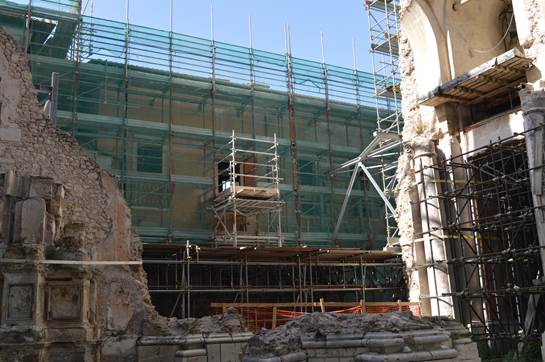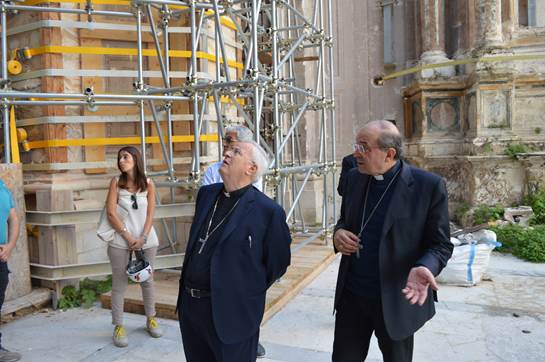
Follows the unabridged Message of the Archbishop of L’Aquila Msgr. Giuseppe Petrocchi on the occasion of the ninth anniversary of the earthquake that hit the city in central Italy on April 6 2009, leaving 309 dead and over 1600 injured.
The clock that keeps track of the passing of time in L’Aquila did not stop at 03.32 am of April 6 2009. That tragic hour – not alien to God’s mysterious plan of salvation – will forever remain engraved in the memory of our people, but it cannot halt the beating heart of this city. For the Community of L’Aquila this is the time of hard work, of recovery, of wisdom, of closeness: these realms but be set in the present and projected into the future. The earthquake caused not only external damage (that is still visible) but also inner fractures, and both need to be mended. In fact, there is an earthquake that shatters the earth and the earthquake of the soul, that lacerates our mind, our beloved ones and interpersonal relations. That’s why the first verbs that reflect the reconstruction are not “to plan” and “to do” but “to listen” and “to meet”: namely, to welcome people’s deepest needs and identify priority issues, tightening the fabric of “converging relationships” that heighten the factual conscience of being one big family.
L’Aquila should not be reshaped in the past; it must be conceived for the future.
Moreover, L’Aquila should be “resurrected”, not only inside its walls but also externally, encompassing all the neighbouring areas that form part of it.

Some sorrows are so acute and profound that they can’t be expressed in words: perhaps their most immediate expression is an outcry. When crying out loud is impossible these sorrows are kept “mute”. Yet these cries are not silenced; they become “soundless.” Yet this unspoken “voice” is heard all the same, and it’s heart-rending. These “unspoken” messages, expressed through intuitive, empathetic communication, have universal value: in fact they are transmitted though an explicit dialogic code that passes through the heart and flows within the grammar of the most deeply-rooted, authentic emotions. It is my belief that the immortality of human soul is evidenced in two dynamics: everlasting love and suffering, forever engrained in our memory. In fact, while suffering is overcome, the experience of suffering lingers on.
The Easter of Christ abides in every form of suffering. It redeems it and transforms it – if we want to – into a source of salvation. If the soil where deep sorrow was sown is vivified with the water of the Gospel it will bear the fruits of resurrection. Let us remember all the victims of this terrible tragedy: both those devastated by the earthquake and those who perished at a later stage as a result of “post-earthquake traumas.” We know that death lacks the power of erecting insurmountable barriers separating those living “hither” and those “living yonder.” The faith in Jesus, the resurrected-Crucifix, assures us that the paths of communion are wide open, enabling the exchange of the gifts of the Gospel. Most of all, a great flow must be activated in the spiritual artery of prayer, that we are called to undertake every day. This path of prayer reposes on the great pillar of Christian love, that links the Sky and the earth.

The painful experience of the earthquake also imparts a fundamental lesson: it teaches us to focus on what is essential, on what truly counts and will never be taken away from us.
Veritable friendship – that ties us to the brothers and sisters dwelling in God’s eternal Home – leads us to strengthen the bonds of cohesion, ecclesial and civil alike, and to mobilize all our forces in the joint quest for the common good. Everyone is called to meet this challenge: each in his/her part and nobody excluded. Such moral and social progress (that we hope will be marked by growing efforts) will prove that the ordeal of suffering has been a master of life and that the sacrifice of our brothers and sisters served its purpose.

The great embrace of love, Christian and human, can incorporate everyone: those walking along the paths of time, and those already landed on the shores of God’s everlasting life. That’s the reason why our brothers and sisters who crossed the threshold of history and entered the hereafter, should be referred to not only as those who “were” with us before. In fact we must also say that they continue “being” near us today. All of us, “us” and “them”, encounter the same Lord. In Him “they are one in Us” (John 17, 20-21), while waiting for the time when we will all come together, with joy, in the Heavenly City, where “there shall be no more death, neither sorrow, nor crying,” (Rev. 21: 4), for “God may be all in all” (Cf. 1Cor 15:28)!
(*) archbishop of L’Aquila











